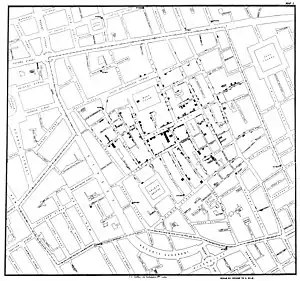Human geography
Human geography is a branch of geography. It studies how people and environment have an effect on each other.

Original map by John Snow showing the places where cholera cases occurred in the London epidemic of 1854 - This is a classical case of human geography
The study of people includes their communities, cultures, economies. The environment studied is mostly about locations.[1] Locations include where people live, when people move, where they move to, what customs they have, what recreations they have.
Human societies develop in relation to the environment they are in. The relationship between people and the environment can change over time and across different locations. Human geography studies these changes.
The field of geography can be divided into physical geography and human geography. Human geography is also closely associated with social sciences and philosophy.[2]
References
- Johnston, Ron (2000). "Human Geography". In Johnston, Ron; Gregory, Derek; Pratt, Geraldine; et al. (eds.). The Dictionary of Human Geography. Oxford: Blackwell. pp. 353–60. ISBN 9781444359954.
- "Human Geography: Defining Human Geography". Dartmouth Library. Aug 18, 2017. Retrieved 15 September 2017.
This article is issued from Wikipedia. The text is licensed under Creative Commons - Attribution - Sharealike. Additional terms may apply for the media files.